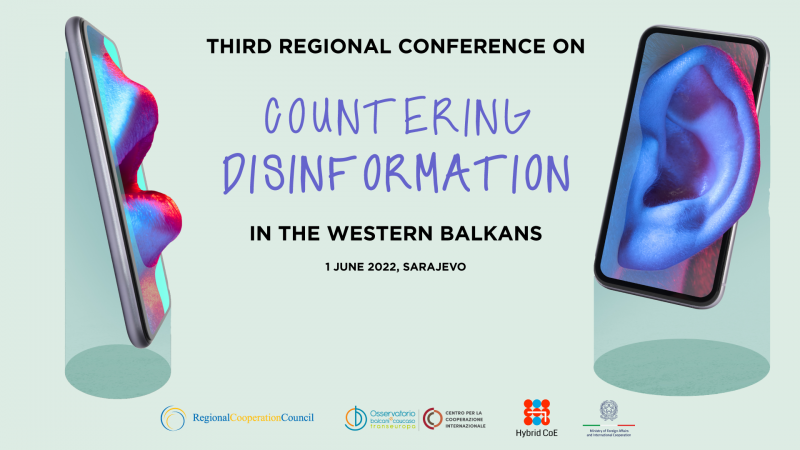- Home/
- News
Join the "Third Regional Conference on countering disinformation in the Western Balkans"

Photo: THIRD REGIONAL CONFERENCE ON COUNTERING DISINFORMATION IN THE WESTERN BALKANS” Sarajevo, Bosnia and Herzegovina (Hybrid mode) - 01 June 2022
From the beginning of its "Countering disinformation in the Western Balkans" activity in 2020, the Regional Cooperation Council (RCC) has formed partnerships with regional and EU partners who want to support the work to empower WB citizens with knowledge and tools to build resilience against false, harmful, and misleading information.
Regional Cooperation Council (RCC) is organizing, in cooperation with the Osservatorio Balcani e Caucaso Transeuropa (OBCT) from Trento and The European Centre of Excellence for Countering Hybrid Threats (CoE Helsinki), a Third Regional Conference on countering disinformation in the Western Balkans. The conference will be held in hybrid mode from Sarajevo, via online platform ZOOM.
The digital revolution has exponentially expanded the availability and accessibility of information from an endless number of sources. In addition to obvious benefits of this information explosion, it has also created ample space to initiate and spread false, harmful and misleading messages, thus increasing the vulnerability of societies and individuals to manipulation. In fact, research studies have shown that the information age has not increased the level of knowledge and understanding of the general population. Indeed, consumers of information are often biased in favour of information that confirm their existing beliefs and personal feelings, rather than leaning toward objective indicators. Moreover, false information are difficult to detect, even to advance IT users.
In this sense Western Balkans belong to the trajectory of the global trends. However, a number of factors of the socio-political and media environment in this region increase the vulnerability of societies to the dissemination of disinformation: state of political polarization, low socio-economic standards in the population and inequality, corruption and clientelism in the media, non-transparent ownership structures, deteriorating journalistic standards, and a low level of IT and media literacy of citizens.
Reflecting this are the findings of SecuriMeter, the RCC survey of public opinion on security issues. 75% of respondents of consider disinformation a problem for democracy, causing harm to: economy and finance (57%); trust in public institutions (54%); and health policies (51%). 54% of respondents recognized coming across news or information that misinterpret reality several times a month.
There is also the matter of the role of young people in the new digital age. According to Balkan Barometer, youth aged 18-24 are the most frequent users of the internet and social media among all age groups, but the findings also show that they are predominately active on different platforms than their older counterparts (e.g. Instagram v. Facebook). This generational gap poses distinct challenges in terms of vulnerability as well as responsibility of young people as consumers and sharers of information.
With that in mind, the Third Regional Conference on Countering Disinformation in the Western Balkans will seek to provide both the theoretical and practical skills to students of journalism and communications – representing their generation on one hand, and on the other being the upcoming information content creators. Thus the aim of the Conference will be to:
- - Elaborate on the threats pertaining to the proliferation of disinformation in the Western Balkans and why it is important to resist it;
- - Discuss the current and potential role of youth organizations to support media literacy and disinformation resilience among young people in the Western Balkans;
- - Equip the students with tools that allow them to more readily and easily detect disinformation, in order to prevent their further dissemination across media channels and promote quality journalism;
- - Present best practices of effective public communications in the context of the digital age, mindful of the trust gap between citizens and traditional communications actors.
-
Zoom registration link:
-
https://us06web.zoom.us/webinar/register/WN_PN9jIpARQaeIriDAaZs_hA
Documents Agenda


 Development of specialized PCVE web site is funded by EU FUNDS CN 2017-386/831 - "IPA II 2016 Regional Action on P/CVE in the Western Balkans"
Development of specialized PCVE web site is funded by EU FUNDS CN 2017-386/831 - "IPA II 2016 Regional Action on P/CVE in the Western Balkans"